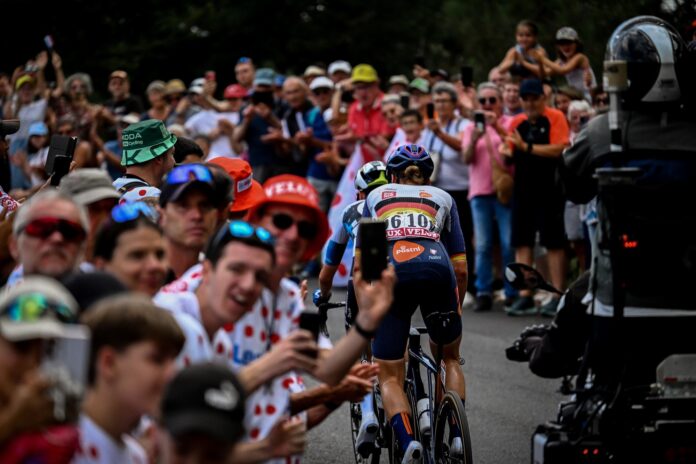The arrival of the Women’s Tour de France will take place this summer on the Promenade des Anglais. However, a debate is emerging: could attending a major finish become a paid event in the future? Recent stances by cycling stakeholders are reviving the question.
Nice is preparing for the arrival of the Women’s Tour de France. The city highlights the event. Teams are already projecting ahead. The public is eagerly anticipating the peloton’s passage on the Promenade des Anglais. The atmosphere promises to be intense. However, a question is circulating. Will it one day be required to pay for access to the finish zones of major cycling races?
The question resurfaced in early November. Former rider and ex-manager Jérôme Pineau mentioned this possibility in a podcast. He spoke amid an economically vulnerable context for several teams. In recent months, some cycling stakeholders have highlighted the rising budgets, the search for new funding, and the lack of resources for professional formations.
Jérôme Pineau presented his idea in the Grand Plateau (RMC) podcast. He suggested that making certain zones paid could be possible. According to him, this would financially support teams. He spoke about iconic finishes and mentioned well-known Tour locations. In his intervention, he stated: “today we are in a system of ultra-rich, but there is no cash. Cycling is killing itself because of this. I am very worried for my sport.”
He then confirmed his proposal. Still in Grand Plateau: “I will shock some people, but today we have created a stage that will do the Alpe d’Huez twice, let’s privatize the last five kilometers of the Alpe d’Huez, charge for entry, create VIP areas, create something to earn money!”
A week later, he reiterated his position in the Super Moscato Show on RMC. He clarified that he wanted to target hospitality zones, not general public access. “When we charge people because we serve them a glass of champagne and give them small pastry samples, they pay a huge bill!” He added: “teams should be compensated because it’s us who put on the show!”
These statements have sparked a debate. Some believe that an economic model without ticketing has reached its limits in a sport that’s rapidly expanding. The end of the season was marked by the disappearance of Arkéa-B&B Hotels. Cofidis has exited the World Tour. TotalEnergies is seeking a new main sponsor. These signals fuel the reflections of several stakeholders.
One of the expressed supports comes from former Italian sprinter Filippo Pozzato. As the organizer of the Veneto Classic, he has already implemented a similar setup. He stated: “It’s the only solution to ensure our future. We are the only sport without ticketing (…) The current economic model is unsustainable because a team gets nothing in return.”
ASO, the UCI, and several officials close the door
In response to these proposals, the Tour organizers react with caution. For now, ticketing is not part of their plans.
Amaury Sport Organisation (ASO), which manages the Tour de France, reacted. Pierre-Yves Thouault, deputy director of the cycling department, was clear: “By nature, cycling is free (for the public) and implementing a ticketing system is absolutely not on the agenda.”
He reaffirmed this position in a second interview cited in another media: “By nature, cycling is a free sport and introducing ticketing is absolutely not being considered.”
The manager of Groupama-FDJ, Marc Madiot, also shares this view: “Cycling is a free sport, and that contributes to its success.”
The president of the UCI, David Lappartient, also expressed his reservations. In an interview, he emphasized: “Ticketing is a bit complicated in the Tour de France because, historically, it’s a national debate.”
These positions show a clear refusal. The organizers defend the idea of an accessible sport. They emphasize its popular identity. Free access is part of this identity. Major races attract diverse crowds. Fans attend without financial barriers. Officials believe ticketing could challenge this characteristic.
For Nice, the question is simple. The arrival of the Women’s Tour de France will remain open to the public. The Promenade des Anglais will welcome spectators as with any major cycling event. The national debate will not impact this edition. But the discussions initiated by some stakeholders in the peloton will not disappear. They may resurface as teams seek a new economic model.
The subject remains sensitive. It touches on the history of cycling. It questions its financing. It challenges its future. For now, organizers are closing the door. But the debate is on. And it could resurface when the budget issue returns to the professional peloton’s news.


